Hello,
First it is important to give yourself a very firm and big pet on the back. You have gone above and beyond and saved these kittens from a slow awful death. Next this isn’t a question about the colon this is a question about what is causing all of the clinical signs you are seeing. Ileus (slow or absent moving gi tract) has many many causes but something caused it. Probably has everything to do with the same something causing everything else you are seeing. There is a huge list of possible causes. Infection, congenital disease, malnutrition before they got to you. Infectious disease like rabies, etc etc. my recommendation is to stick with the basics of keeping them warm, fed, and treated for parasites (internal and external). After that (or before your preference often dictated by amount owner can spend) is to keep asking for second opinions and keep running. Diagnostics. I really applaud your dedication and I have to say as much as sometimes we try we just aren’t able to save them all. This is especially true with kittens. Which have been some of the most rewarding and most heart breaking of all the cases I have seen.
Hi, I have a 15 year old chihuahua named Peanut. He was diagnosed with IVDD on Sunday. He is able to stand for 30 seconds on his own and can walk a few steps before falling over. His right front leg and right back leg are the main limbs that knuckle over and give out when he stands. He can’t get himself to an upright standing position. He is currently on Gabapentin and galliprant. When the pain killers don’t have him knocked out he is crying and whimpering. He looks like he is pain and can’t get in a comfortable position . He is eating and drinking water. He is able to use pee and defecate on his own but most of the time does it while he’s laying down in his pen.
I feel so bad for him I’m honestly just crying all the time because it hurts to see him in pain and I feel helpless. I try and let him stand and walk for a few
Minutes a day with my support but should I be letting him walk? Or should I be trying to make him rest more? Also he doesn’t let me switch the side he lays on. He only lays on his right side . I know Dr. Krista said we need to switch the aside they lay on but he looks like he’s in more pain when I try to switch him to the left.
Any advice , thoughts, or feelings? I really just needed to not feel so alone in this.
Comments
Kitten with completely atonic colon, possible causes? (Long text ahead)
So Nov. 3th in the evening we got 2 kittens, estimated 6 weeks old, thin. However due to being cold outside they already had very thick fur, so it wasn’t visible how thin they were. Weight was 550 & 650gr.
The finder said they have been more active before and only now they were able to get those two. They borrowed to live traps to get the mother and another kitten.
Both were seen eating. They were treated against worms (Milbemycinoxim/Praziquantel) and fleas (Lotilaner)
Nov 4th: Overnight everything was eaten, poo was solid. Kittens were responsive and alert. To the evening only half was eaten. Poo was still solid.
Nov 5th: Nothing was eaten over night, the little one seemed a bit weaker. I started to feed them with a syringe. They started with diarrhea, but that sometimes happens when feeding with a syringe.
Nov. 6th: They still don’t eat by themselves. The smaller one still seemed weaker, but otherwise it seemed fine. A bit diarrhea. In the evening I found it the litter box, not being able to stand, barely reacting. It hat vomited (at least it looked like it), and still had poo stuck on it. It was immediately brought to a vet. It received glucose solution s.c., something against vomiting, pain and an antibiotics. Lung sounded free, heart (ultrasound) was fine, too. A test of parvovirosis came back negative. I took both of them home that night, so I could feed it smaller portions more often and to give more fluids. 2 hours later to was able to stand again. I fed them every 3-4 hours, fluids every 6 (only small amounts obviously). It was lying on a warmth mat. The bigger one was fine, but avoided it’s litter mate.
Nov. 7th: No further improvement. None of them was eating on their own. The smaller one was still lying down most of the time, sleeping, but would react when I came to feed them. It would stand up and walk to the litterbox between the feedings, but the poo had a weird consistency. Not really diarrhea, but veeeery sticky, so it always carried it back to it’s sleeping place. So I had to clean it before every feeding. A test on giardia was positive, treatment started with Carnidazol. Continue to feed them with a Syringe and fluids for the smaller one. Fluids were always absorbed to the next feeding, but it still was a bit dehydrated (skin fold test). The bigger one would play in between and seemed fine otherwise.
Nov. 8th: No changes in the smaller one during the day, still weaker, able to walk, sit and stand, but sleeping most of the time. Today there was rarely poo in the toilet. I assumed that the treatment started working and it was a good sign (although I already had the feeling that something was wrong… wish I would have trusted that feeling). In the evening it seemed weaker, but would still accept being fed with a syringe. It felt different, less body tension, but would still walk away/go to the t. 10pm feeding. More calm, didn’t want to eat that much, peed on me. Meowed louder during giving the fluids than usual and tried to get away. 2am clock, the fluids weren’t absorbed completely, it’s abdomen felt like a sponge. I only fed a tiny amount. 6am weaker, would lie down immediately, breathing was shallow and faster, meowing, I didn’t feed it, fluids still not absorbed. Rushed to the vet.
-> Heart had a low frequency, breathing fast and shallow
-> X-Ray lungs were free, only a tiny amount of fluids in the abdomen, however the complete colon and stomach were filled with food. There was no visible blockage or air.
-> Ultrasound: Absolutely no movement in the colon/stomach, no blockage or air seen either. Kidneys and liver seemed fine
-> Punctation of the abdomen: ca. 3-4ml of fluids, lots of proteins, a bit of blood. Didn’t look like FIP. Possible that the fluids came out of the colon.
It was given something against vomiting, pain, antibiotics, something to help the cardiovascular system and something to get the colon moving again. To help with its breathing got a mask with additional oxygen. However in the next hour it got worse, so we decided to let it go. After it was gone food came back out of it’s mouth. And it didn’t even smell like it had started to digest.
It’s littermate is still with me and fine. It started to eat on its own yesterday.
Now I obviously ask myself what i could have done better/different. By now I think I should have started with additional syringe feeding earlier – at least with the smaller one. And I should have reacted when my feeling told me that something was wrong, even when there were no obvious changes yet. I somehow have the feeling that I sis something wrong and killed it. Did I give too much fluids (but lungs were free and only a bit fluid in the abdomen)? Did I feed too much? Other kittens eat even more without problems – and the other one is fine.
And what can be the causes for the complete stop of movement in the colon/stomach?
I know that FIP can cause this and an ileus (but there were no visible blockage, everything was filled with food), are there other causes? Can giardia do this?
Comments
Hi so my pug seems like he is in pain on his back leg he walks on it but usually liftes it up and he keeps chewing on his paw what can I do
Comments
took are one year old cat in to see the vet because he could not urinate. On exame the vet drew fluid and did a ultrasound. There was blood in the urine and the ultrasound showed some indications of foreign bodies but not crystals. She gave us Clavamox a antibiotic, prazosin for inflammation and Buprenorphine for pain all was ok for two weeks then are cat Leo was back in trouble again with not urinating . Same m.o. , and she told us about the PU surgery, or leaving him there for a few days while they but a catheter in him to reestablish his bladder function. My question is this, we feed are cat raw food that we make from chicken livers and hearts with bone ground up for fiber . Leo drinks lots of water so we are wondering why this is recurring in such a young male cat that is a outdoor cat . Is there something we are missing in Leos care or prevention of this problem . love your videos on youtube and saw the cat being unblocked with a catheter, wish we could do that at home.
Comments
Hi, i need all the advice and help you guys can give me. I have a two-year-old French bulldog and yesterday morning we realized she was a little paralyzed from her hip down she ate and pooped fine. Took her to the emergency room they diagnosed her with IVDD. They told me they need to do surgery on her spine and I can’t afford the surgery process. Is there other options? She’s on steroids and pain medication
Prednisone
Gabapentin
Prazonsin
Please help us she means the world to our family!
Comments
I recently adopted my cat, Critter, as he was on my grandma’s farm and had a paw infection. We brought him inside and started him on antibiotics. Unfortunately, the infection did not respond as hoped and he had to have his leg amputated.
After this, he was back to a perky young cat – playing and eating well. A week after surgery I noticed a bump just below the incision. I asked my vet if I should be concerned, and she said not unless it’s hot and that it’s probably a seroma. This made sense to me as he was more active than he probably should have been post surgery.
The next day, that bump burst and started leaking fluid. It was pink and not super cloudy, not smelly or hot. I kept and eye on it all day, and found that it never stopped leaking, so today I took him to the vet. There appears to be a small hole and it’s infected. It’s not at the site of the incision and the incision looks perfect.
He’s on a higher dose of antibiotics now, and some more pain meds as it is tender. He had the wound flushed this morning, and goes again in two days for another flushing.
I guess my question is – is it possible this is the same infection as before? The vets who performed the amputation said they were positive they got any infection (even taking the lymph node), I’m hoping that this is secondary and that maybe the bump was caught on something, or he scratched it open?
ETA: 1st photo is Saturday night, 2nd photo is Sunday afternoon, 3rd photo is today after flushing and rest.
Comments
Hello. I have a 15 year old Dachshund, Brody, who is currently suffering from a cervical IVDD injury. This is Brody’s third IVDD injury in his short life, however, it is the most severe. We are not sure what happened this time since Brody was injured when we got home from work. Today is day 7 since Brody went down. While Brody is able to right himself from the lateral position, he does spend most of his time on his side. Brody is able to lift his head and look around, he can scoot himself from one position to another, he has a fantastic appetite, he has feeling in his hind quarters and only deep pain in his front two. My poor boy is not able to consistently empty his bladder and has required cathing; as of today, with the help of lactulose, Brody has been able to empty his bowels, incontinent.
Brody is not a candidate for surgery due to his age and other health conditions, so we are managing him conservatively. Brody has been seen by his regular vet where he was started on prednisone, robaxin, & gabapentin; he also takes CBD and I just started him on tumeric paste. Brody has seen a holistic vet where he had acupuncture done with electro stimulation.
My question is, how long do I give him before we decide that enough is enough? Brody is not in extreme pain, but he does have occasional neck/shoulder spasms that make him scream. I just am afraid of putting him through more than what I should just because I am not ready to let him go. Brody has been my guy for 15 years and I cannot imagine life without him, but I don’t want him to suffer. I have watched Dr. Magnifico’s YouTube videos about giving IVDD dogs time, but what is a realistic timeframe?
Comments
i apologize i’m advanced if this is confusing to read its kind of difficult to explain what im trying to say. i have an 11 year old rottweiler named Roxy. she’s been more amazing than you could ever ask for. as she has gotten older she has obviously gotten slower and it got to the point recently where when she would sit down she would sit on the side of her leg, she needs assistance getting up, and when walking you have to support her back half for a minute then she can walk on her own for a while till she needs a break. She can’t really bend one of her hind legs anymore. i’ve took her to the vet but am currently looking for a new vet because this one kept her 5 days, he called on day 2 and told me she was responding to some medication good. then called me on day 3 and told me she seemed paralyzed in the back half, then called me on day 4 and told me she didn’t seemed paralyzed and was walking better and i could come pick her up the next morning. i get there and he is very short about Roxy’s problems, doesn’t tell me much of anything wrong with her just gives me $300 in medication to give her at home. i’m working with her everyday helping her walk anytime she wants to move and she does seem to be slowly getting better. She never whines or acts like she’s in pain when moving or if you touch the back legs. She’s still full of life, her back legs are just holding her back. I’m going to do anything it takes to make sure she’s living as happy as she can and was just looking for any suggestions on what her problems could be and any thing i could do to help her
Thank you for any help i’m advance!!
Comments
Hi! I have a question about my cat who will be 4 at the end of this month. Sometimes when he stretches, I notice that his rear end (particularly his anus) looks like it is protruding. I thought he had a hemorrhoid but then he stood up and walked like normal and it went “away”. I have another cat and I never noticed this on him. It’s not red, it just looks puffy sometimes. He is eating, drinking and playing like normal. I just want to make sure he is okay and he is not in pain or anything or if this warrants a vet visit. I tend to worry about my boys a lot because I love them so much but I don’t want to be “missing” something. Thank you so much!
Comments
We have a beautiful beagle boy who is around 10, he has gained weight as he had gotten older and is currently on a diet. He has IVDD in his neck. He is still able to move on his own and has no issues with the bathroom however has spasms of pain during which he is very painful. Currently he is on pain killers, steroids and is taking joint supplements and is crated. The vet has also recommended getting an arthritis shot per week however the weekly trip to the vet seems to aggravate him and whenever we get home he has another spasm. We are trying to manage him conservatively for now and I am wondering if we should persevere with his diet while he is recovering and if we should stop taking him to the vet weekly until he is a bit better as these trips seem to set him back. Thank you!








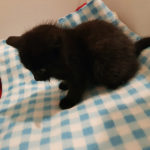

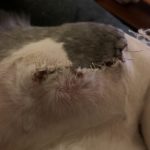
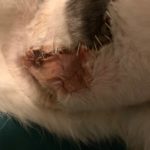


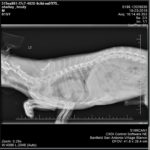
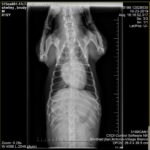
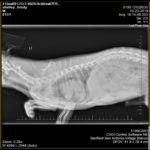
Peanuts X-rays
Good morning-
I’m so sorry you are going trough this. Dr. Magnifico has a lot of videos regarding ivdd posted, and you might find them useful. Another thing to maybe try as far as getting him on his opposite side- when he has his pain killers in his system and is sleeping for close to it, perhaps gently maneuver him to the another side and see if that works any better. If he is not giving up, please don’t give up either. Best of luck to you both!!!!
Thank you so much for the advice! I’m going to continue to fight with him as long as he can. He still looks like he’s trying his hardest!